How to thicken the lines drawn by CAD
How to thicken the lines drawn by CAD: first open the CAD software on the computer; then draw the required thin lines; then enter the command "w" in the command bar below the CAD software interface; finally Enter the desired thick line value and click the Enter key.

The operating environment of this article: Windows 7 system, AutoCAD 2007, Dell G3 computer.
Use the W command in CAD software to thicken the drawn lines. Please refer to the following steps for specific operations.
1. First, open the CAD software on your computer and enter the main editing interface.
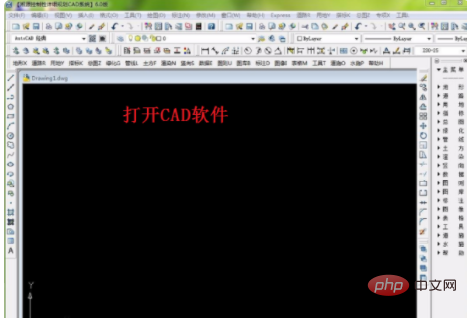
#2. Then draw the required thin lines. Here we demonstrate drawing a simple thin solid line rectangular frame.
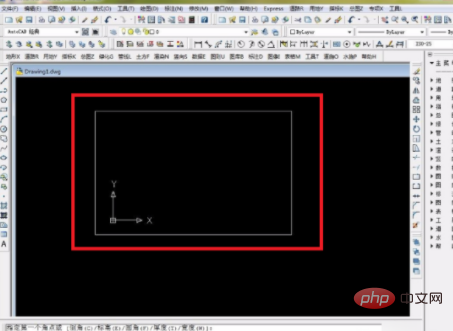
#3. Then double-click the rectangular box, and the line will appear in the form of a dotted line. Then enter the command "w" in the command bar below the CAD software interface.
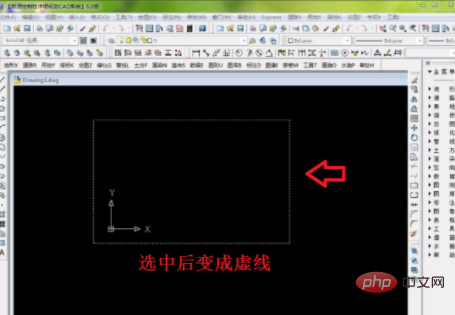
#4. Then enter the required thick line value, and then click the Enter key.
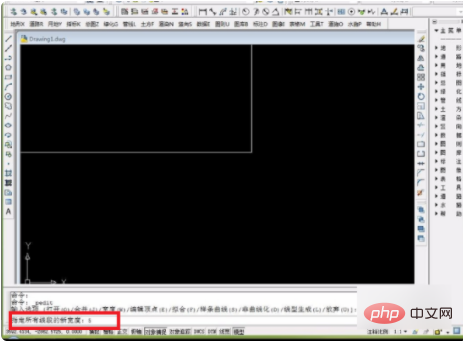
#5. After completing the above settings, you can thicken the drawn lines in CAD.
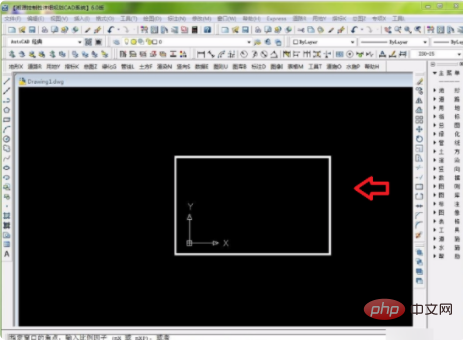
For more related knowledge, please visit PHP Chinese website!
The above is the detailed content of How to thicken the lines drawn by CAD. For more information, please follow other related articles on the PHP Chinese website!

Hot AI Tools

Undresser.AI Undress
AI-powered app for creating realistic nude photos

AI Clothes Remover
Online AI tool for removing clothes from photos.

Undress AI Tool
Undress images for free

Clothoff.io
AI clothes remover

Video Face Swap
Swap faces in any video effortlessly with our completely free AI face swap tool!

Hot Article

Hot Tools

Notepad++7.3.1
Easy-to-use and free code editor

SublimeText3 Chinese version
Chinese version, very easy to use

Zend Studio 13.0.1
Powerful PHP integrated development environment

Dreamweaver CS6
Visual web development tools

SublimeText3 Mac version
God-level code editing software (SublimeText3)

Hot Topics
 1670
1670
 14
14
 1428
1428
 52
52
 1329
1329
 25
25
 1276
1276
 29
29
 1256
1256
 24
24
 Laravel Eloquent ORM in Bangla partial model search)
Apr 08, 2025 pm 02:06 PM
Laravel Eloquent ORM in Bangla partial model search)
Apr 08, 2025 pm 02:06 PM
LaravelEloquent Model Retrieval: Easily obtaining database data EloquentORM provides a concise and easy-to-understand way to operate the database. This article will introduce various Eloquent model search techniques in detail to help you obtain data from the database efficiently. 1. Get all records. Use the all() method to get all records in the database table: useApp\Models\Post;$posts=Post::all(); This will return a collection. You can access data using foreach loop or other collection methods: foreach($postsas$post){echo$post->
 Laravel Redis connection sharing: Why does the select method affect other connections?
Apr 01, 2025 am 07:45 AM
Laravel Redis connection sharing: Why does the select method affect other connections?
Apr 01, 2025 am 07:45 AM
The impact of sharing of Redis connections in Laravel framework and select methods When using Laravel framework and Redis, developers may encounter a problem: through configuration...
 Vue and Element-UI cascaded drop-down box props pass value
Apr 07, 2025 pm 07:36 PM
Vue and Element-UI cascaded drop-down box props pass value
Apr 07, 2025 pm 07:36 PM
The data structure must be clearly defined when the Vue and Element-UI cascaded drop-down boxes pass the props, and the direct assignment of static data is supported. If data is dynamically obtained, it is recommended to assign values within the life cycle hook and handle asynchronous situations. For non-standard data structures, defaultProps or convert data formats need to be modified. Keep the code simple and easy to understand with meaningful variable names and comments. To optimize performance, virtual scrolling or lazy loading techniques can be used.
 How to learn Laravel How to learn Laravel for free
Apr 18, 2025 pm 12:51 PM
How to learn Laravel How to learn Laravel for free
Apr 18, 2025 pm 12:51 PM
Want to learn the Laravel framework, but suffer from no resources or economic pressure? This article provides you with free learning of Laravel, teaching you how to use resources such as online platforms, documents and community forums to lay a solid foundation for your PHP development journey from getting started to master.
 Issues with Dev-C version
Apr 03, 2025 pm 07:33 PM
Issues with Dev-C version
Apr 03, 2025 pm 07:33 PM
Dev-C 4.9.9.2 Compilation Errors and Solutions When compiling programs in Windows 11 system using Dev-C 4.9.9.2, the compiler record pane may display the following error message: gcc.exe:internalerror:aborted(programcollect2)pleasesubmitafullbugreport.seeforinstructions. Although the final "compilation is successful", the actual program cannot run and an error message "original code archive cannot be compiled" pops up. This is usually because the linker collects
 How to delete a column in SQL
Apr 09, 2025 pm 02:21 PM
How to delete a column in SQL
Apr 09, 2025 pm 02:21 PM
Delete table columns in SQL and use the ALTER TABLE statement, which includes three steps: determining the column name to be deleted, writing an ALTER TABLE statement, and executing a statement.
 Download link of the virtual currency website mobile version APP (the top ten recommended in the world)
Mar 04, 2025 pm 03:48 PM
Download link of the virtual currency website mobile version APP (the top ten recommended in the world)
Mar 04, 2025 pm 03:48 PM
This article compares and reviews nine mainstream cryptocurrency exchanges in OKX, Binance, Gate.io, Huobi, Kraken, Coinbase, KuCoin, Crypto.com and Bitstamp. The article conducts detailed analysis and comparison of each exchange from multiple dimensions such as technical advantages, security system, product innovation, global layout, compliance progress, fees, user experience, ecosystem, market position, etc., aiming to help users choose the platform that best suits their needs. OKX is famous for its distributed architecture and derivative trading; Binance occupies a leading position with the world's largest trading volume and rich ecosystem; Gate.io focuses on wide currency coverage and low rates; Huobi focuses on localized services and technical strength;
 What are the recommended websites for virtual currency app software?
Mar 31, 2025 pm 09:06 PM
What are the recommended websites for virtual currency app software?
Mar 31, 2025 pm 09:06 PM
This article recommends ten well-known virtual currency-related APP recommendation websites, including Binance Academy, OKX Learn, CoinGecko, CryptoSlate, CoinDesk, Investopedia, CoinMarketCap, Huobi University, Coinbase Learn and CryptoCompare. These websites not only provide information such as virtual currency market data, price trend analysis, etc., but also provide rich learning resources, including basic blockchain knowledge, trading strategies, and tutorials and reviews of various trading platform APPs, helping users better understand and make use of them



